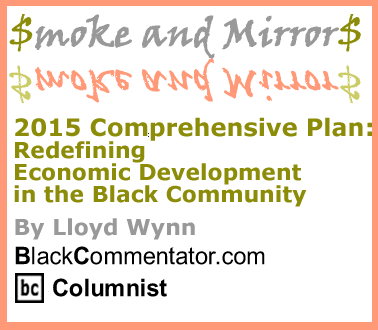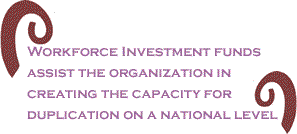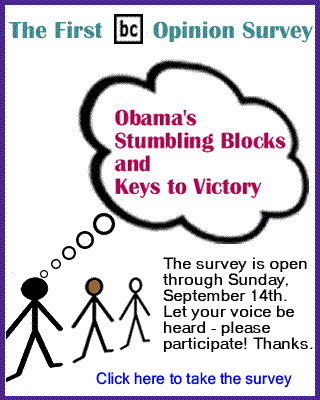
|
|||||||||||||||||||||||

|
|

Custom Search
|
|
 |
|
Jerome
C. received offers for a chess scholarship from several colleges
but instead of walking the halls of ivy, he lay on a DC sidewalk
with a bullet wound to the head, waiting for an emergency vehicle
to take him to Howard University Hospital and then to the DC Morgue.
Charles S. has operated his home improvement business for the
past 31 years. He had a commercial contract to provide construction
services for each store that was opened in the DC metropolitan
area for a national retail outlet until the economy collapsed.
Tyrone P. is a former marine and Gulf War veteran. Tyrone discovered
the transition to civilian life was challenging for a Black man
in Some of you may recognize the title as a combination of an oft-used term to describe land use, policy development and environmental analysis in many jurisdictions around the country and the term Black America which denotes the target population. By design or oversight, these plans have not improved the conditions within the Black community. Economic development plans within the target community, separate from gentrification, have been deficient in providing job stability, ownership opportunity, increased household income or a better quality of life for the target population. Typically, they are one-dimensional, piecemeal and disjointed. On one end of the spectrum we have a cabal of marketers parading around the country disguised as economic development specialists, who are unable to produce any multiplier effect other than separating the uninformed from their money. On the other end we have community-based organizations, with some exceptions, which are extremely inefficient and yield very little return on aggregate investment. ARI will introduce an initiative to revitalize the community with businesses that practice sustainability and training for green collar jobs.
Outsiders
understand there is value within our communities, otherwise the
snake-oil salesmen would not be there nor would gentrification
occur. There are many buildings on Next, come to grips with what is happening within the economy. Going forward, the economy will be enormously different than what it was last year or even today. In 10 short years, the economic pendulum swung from imaginative deals such as developing derivatives from the royalties of David Bowieís music to Fannie Mae and Freddie Mac going into conservatorship. Many of us have not and will not accept this reality. A sea change has occurred and we continue writhing in the throes of consumerism. This economy is entering a new phase and our thinking is steeped in the old economy. Credit was the motherís milk of this economy but now it is evaporating across many sectors, leaving a trail of economic devastation. Black
men and women from
Workforce development/training
In addition to the fiscal benefits and capacity for duplication, if designed correctly, workforce training can directly impact the lives of those who will not attend college, i.e. those brothers we complain about but do very little to help. Jerome C. survived the bullet wound to the head, however, 3 of his crew members have been murdered on the streets of DC, since Jerome enrolled in the Heating, Ventilation and Air Condition training program at Anchor Renaissance Institute in April. Jerome, a quick-witted, young man of 28, could have become one of the ďtalented-tenthĒ but instead, became a thug. And after his near-fatal experience, he decided to go in a different direction. He heard about the training program for the hard-to-employ, at ARI and opted to move forward with his life. Too many Black men are similarly situated and find themselves with few alternatives. They will never attend college but we might induce them to enroll in a training program to obtain some marketable skills and put them on a different career path.
Options certainly are critical to a free-society and we have restricted the choices available to those who will not attend college. But we can expand the choices by establishing training centers With Black Ownership, hopefully at the end of this article you will accept the premise, Black Ownership is critical. Antithetical to ownership are some common misunderstandings about training or proprietary schools: 1) they are not profitable; 2) the licensing process is too cumbersome; 3) the education and training is inferior; and 4) the start-up costs are too great. While opening a career or technical training school is not a walk in the park, it is not as difficult as one might believe. However, it does require a passion, dedication and superior organizational skills. The Black community is in dire need of Black-Owned career schools as an alternative method of preparing our citizens for the world of commerce, either as entrepreneurs or skilled laborers. We should have no less than one Black-Owned workforce training program in every county where there is a statistically significant Black population. An important decision about options or alternatives can be made now, today and that is a commitment to the Green Economy. This nascent sector is ready for rapid expansion and development. The chances are excellent that you know as much about green collar jobs as the person next to you. But we have an opportunity to position ourselves on the supply-side of the economic scale. Today we should be training photovoltaic installers, landscapers with sustainable practices, organizing workshops on LEED Certification, and encouraging academic preparation at the graduate level in sustainability for those entering the corporate world. GM and Ford are asking the US Government for $50 billion to essentially retool for the Green Economy. Do you think it is time to go Green? To summarize on workforce development, human capital is our most valuable asset. In its present form, it is illiquid. Human capital becomes marketable when converted to its most economical use - skilled labor. We need training centers to produce skilled laborers. Training is advisable as the catalyst for economic development since so many other components will evolve from this activity. Additionally, training centers generate revenues if organized tightly and they are the platform to launch Green collar jobs training and the transition to the Green economy. Financial Restructuring
*Homeowners must not only confront the boogeyman of foreclosure but must be ever-so-vigilant against the multilevel marketers and scam artists who profess expertise in loss-mitigation. Instead of paying a few hundred dollars for a script and artificial website, our specialists will be required to take an 80-hour course consisting of originations, secondary marketing and servicing. Homeowners can be confident they are receiving accurate and timely advice when working with a loss mitigation specialist trained by ARI. Implementation
It is estimated that 10 million households have a mortgage balance greater than the market value of their home (upside-down/underwater) which places them in the high risk category of impending foreclosures. According to the Mortgage Bankers Association, more than 4 million homeowners were at least 30 days delinquent on their mortgage as of July 1, 2008. It is unreasonable to think the new housing bill, limited to 400k households statutorily, will have a substantial impact on the number of households expected to go into foreclosure amid the continuing decline in the markets. A more robust effort will be required by the private and public sectors to mitigate the severity of the fallout from foreclosures. The challenges from the labor perspective-finding competent loss mitigation specialists - are offset by the opportunities presented by a need for some kind of organized response to the foreclosure epidemic. Well-trained loss-mitigation specialists are essential to the national response to this crisis. The skills possessed by former employees of mortgage companies make an excellent foundation for training as loss mitigation specialists. Competent loan officers and processors have strong organization and communication skills, while underwriters typically utilize their superior analytical ability, but all possessing skills required by a loss-mitigation specialist. Notwithstanding high unemployment, inability to access credit, erosion of equity, inflation accelerating, homeowners are in distress and so many are delaying the inevitable, foreclosure. Foreclosure can have lingering consequences if not navigated correctly. ARI will begin to train students in servicing, particularly loss mitigation and develop a clinic to assist households that are underwater or facing foreclosure. Through this effort, ARI will be able to create jobs and provide aid to those families dealing with a financial dilemma that is depleting the wealth from our communities daily, with no end to this trauma in sight.
Micro-enterprise development It
is disingenuous of us as a race, beneficiaries of the magnificent
work and sacrifice of Dr. MLK, to allow many
Charles
S., one of the participants in ARIís training program, has been
in business 31 years and employs a number of residents from his
community which is an enormous accomplishment in itself. Charles
S. initially contacted ARI to learn another craft (HVAC) to offer
his customers but discovered how to energize his company and the
importance of entrepreneurs having a network to access. As Charles S. has discovered, running a business is not an easy proposition. Having a good idea and putting in long hours does not ensure success. Micro-businesses require training to meet the endless challenges presented by competitors, taxing authorities, financing, licensing agencies, and employees. Entrepreneurship classes and workshops are vital to the health of a small business and based upon our limited experience and understanding of the dynamics in the inner-cities, many business owners who are in the shadows or operating under the radar, are not inclined to open up to outsiders. Earlier, I alluded to the importance of Black Ownership, partly, because the trust factor or comfort level is not as difficult to establish when trying to guide the micro-enterprise out of the shadows and into the marketplace. Having a community-based training institution should jumpstart the outreach effort to micro-enterprises and perhaps, we can have an impact on inner-city neighborhoods. In summary, proprietary schools or training centers are not a novel idea. It was only 100 years ago that a similar proposal was put forth and rejected for a pathway to be taken by the ďtalented tenthĒ. Now we need to find solutions for preparing our young adults who will not attend college and those who are seeking alternatives to present career paths. Simultaneously, we need to respond to the economic tsunami that struck our community and create entrepreneurship opportunities for those so inclined to business ownership. Clearly, we need a comprehensive economic development plan for the Black community. To the extent we agree human capital is the Black communityís most abundant asset, we should seek ways to make that asset work for us. ARI will assist any qualified individual or organization seeking to establish a training center in their community to jumpstart their neighborhood economy. BlackCommentator.com Guest Commentator, Lloyd Wynn was a consultant in the secondary market. Lloyd is the author of Residential Real Estate Finance: From Application Through Settlement. Click here to contact Lloyd Wynn. |
|
Any BlackCommentator.com article may be re-printed so long as it is re-printed in its entirety and full credit given to the author and www.BlackCommentator.com. If the re-print is on the Internet we additionally request a link back to the original piece on our Website. Your comments are always welcome. eMail re-print notice
If you send us an eMail message we may publish all or part of it, unless you tell us it is not for publication. You may also request that we withhold your name. Thank you very much for your readership. |
|
| |
|
| September 11, 2008 Issue 290 |
|
| Executive Editor: Bill Fletcher, Jr. |
| Managing Editor: Nancy Littlefield |
| Publisher: Peter Gamble |
| Est. April 5, 2002 |
Printer Friendly Version
in resizeable plain
text format or pdf
format. |
| Frequently Asked Questions |
 |

|
 |
 |
 |
| |
| |




























 ARIís
new initiative - the 2015 Comprehensive Plan for Black America
- will require a shift in thinking about economic development
and the Black community. First, we ask that you raise the bar
when evaluating or comparing initiatives that are brought into
your neighborhood by developers purporting expertise in neighborhood
organization. Too often when they depart we have as many people
at or below the poverty level as when they arrived. A three-pronged
test will determine if an economic development plan is a good
fit for your community. Ask yourself can the initiative: 1) increase
household incomes; 2) improve the quality of life in the neighborhood
and 3) network my community with similar neighborhoods for commercial
exchange.
ARIís
new initiative - the 2015 Comprehensive Plan for Black America
- will require a shift in thinking about economic development
and the Black community. First, we ask that you raise the bar
when evaluating or comparing initiatives that are brought into
your neighborhood by developers purporting expertise in neighborhood
organization. Too often when they depart we have as many people
at or below the poverty level as when they arrived. A three-pronged
test will determine if an economic development plan is a good
fit for your community. Ask yourself can the initiative: 1) increase
household incomes; 2) improve the quality of life in the neighborhood
and 3) network my community with similar neighborhoods for commercial
exchange.
 Workforce
training has innumerable benefits to the community, not the least
being a primary source of income for the organization if the training
program is approved by the local Workforce Investment Board. Workforce
Investment funds assist the organization in creating the capacity
for duplication on a national level. Some of you may recall the
Workforce Investment Actís (WIA) predecessors, Manpower, CETA
and JTPA. Proponents of the WIA believe the workforce system has
been streamlined and is accessible and user-friendly, to the extent
any federal program can be. The revenues derived from this source
are generally sufficient to maintain the training program but
it is advisable to supplement revenues through other activities
as well.
Workforce
training has innumerable benefits to the community, not the least
being a primary source of income for the organization if the training
program is approved by the local Workforce Investment Board. Workforce
Investment funds assist the organization in creating the capacity
for duplication on a national level. Some of you may recall the
Workforce Investment Actís (WIA) predecessors, Manpower, CETA
and JTPA. Proponents of the WIA believe the workforce system has
been streamlined and is accessible and user-friendly, to the extent
any federal program can be. The revenues derived from this source
are generally sufficient to maintain the training program but
it is advisable to supplement revenues through other activities
as well.
 ARIís
vision is to restore fiscal health to100,000 families that are
casualties of the subprime crisis. In workforce development, one
cannot focus singularly on training when the target population
has a variety of unresolved issues that directly impact performance
in training and as well as on the job (training centers become
clearinghouses or hubs for social and economic activity). An unresolved
issue in the general population and particularly acute in the
target population, is foreclosures. Foreclosures, unlike origination
(buying and closing on a home) are adversarial in nature. Most
families experiencing foreclosure will endure considerable legal,
fiscal and social challenges before they rebound from this catastrophic
even. Conservatively, 5 million households will be foreclosed
on by the 4th quarter of 2011. ARIís goals are to:
ARIís
vision is to restore fiscal health to100,000 families that are
casualties of the subprime crisis. In workforce development, one
cannot focus singularly on training when the target population
has a variety of unresolved issues that directly impact performance
in training and as well as on the job (training centers become
clearinghouses or hubs for social and economic activity). An unresolved
issue in the general population and particularly acute in the
target population, is foreclosures. Foreclosures, unlike origination
(buying and closing on a home) are adversarial in nature. Most
families experiencing foreclosure will endure considerable legal,
fiscal and social challenges before they rebound from this catastrophic
even. Conservatively, 5 million households will be foreclosed
on by the 4th quarter of 2011. ARIís goals are to:
 ARIís
senior staff for Financial Restructuring consists of 3 seasoned
managers who bring a combined 65 years of mortgage banking experience
from several different perspectives - servicing, underwriting,
due diligence and training. The staff collaborated on a curriculum
for loss-mitigation to be submitted to the local workforce investment
board for approval. Once approved, residents within the scope
of the local Workforce Investment Board who are receiving some
form of social service assistance (TANF, unemployment comp., voc.
rehab., food stamps, social security, etc.) are eligible to participate
in the training program at no cost to the student. Graduates from
this program can expect to find employment in a number of different
sectors due to the meteoric rise of foreclosures in the housing
industry. Servicers (companies managing mortgage accounts) local
government agencies, fund managers, financial institutions, law
firms, organizations offering pre-and post-purchase counseling
and developers will need loss-mitigation specialists to address
the fallout from the collapse of the housing market.
ARIís
senior staff for Financial Restructuring consists of 3 seasoned
managers who bring a combined 65 years of mortgage banking experience
from several different perspectives - servicing, underwriting,
due diligence and training. The staff collaborated on a curriculum
for loss-mitigation to be submitted to the local workforce investment
board for approval. Once approved, residents within the scope
of the local Workforce Investment Board who are receiving some
form of social service assistance (TANF, unemployment comp., voc.
rehab., food stamps, social security, etc.) are eligible to participate
in the training program at no cost to the student. Graduates from
this program can expect to find employment in a number of different
sectors due to the meteoric rise of foreclosures in the housing
industry. Servicers (companies managing mortgage accounts) local
government agencies, fund managers, financial institutions, law
firms, organizations offering pre-and post-purchase counseling
and developers will need loss-mitigation specialists to address
the fallout from the collapse of the housing market.

 Micro-enterprise
developmentís role in the 2015 Comp Plan cannot be minimized.
ARIís mission is to organize the economies - primarily micro-enterprises
- within the inner-cities. Micro-enterprises generally provide
employment and training opportunities for residents. Another benefit
of micro-enterprise development is that many businesses already
exist in some form in the neighborhood. Some are underground and
in homes; they need training to come out of the shadows. Others
need training to expand and create more jobs. Primarily, they
all need a business checkup to assess their condition.
Micro-enterprise
developmentís role in the 2015 Comp Plan cannot be minimized.
ARIís mission is to organize the economies - primarily micro-enterprises
- within the inner-cities. Micro-enterprises generally provide
employment and training opportunities for residents. Another benefit
of micro-enterprise development is that many businesses already
exist in some form in the neighborhood. Some are underground and
in homes; they need training to come out of the shadows. Others
need training to expand and create more jobs. Primarily, they
all need a business checkup to assess their condition.




